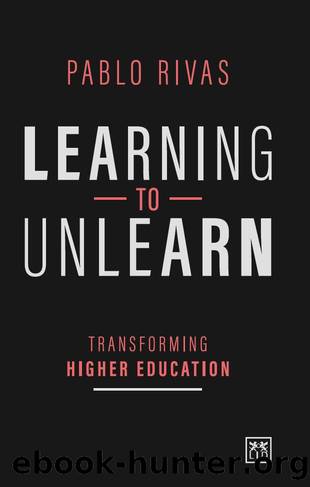Learning to Unlearn by Pablo Rivas

Author:Pablo Rivas
Language: eng
Format: epub
Publisher: LID Publishing Limited
Published: 2020-12-15T00:00:00+00:00
UNIVERSITY IN THE MIRROR
Since the industrial age, work has become an increasingly predictable and routine transaction.36 Things are very similar in the public and private sectors: increasing numbers of people, specialization in particular and standardized tasks, creation and distribution of products and services that are increasingly predictable for customers, and so on.
A good example of this work culture, which tends towards the standardization of processes, products and services, is described in sociologist George Ritzerâs book The McDonaldization of Society,37 an analysis of rationalization in everyday life. In particular, and although Ritzerâs thesis is much broader and richer than the summary here, I want to highlight what the author considers the third aspect of âMcDonaldizationâ: predictability â âthat is, the effort that allows people to know what will happen any time, anywhere. The goal is to create a world in which there are no surprises.â This is exemplified, for example, in the Holiday Inn chain of motels and in various fast food establishments that offer a predictable world in terms of ingredients, flavours, smells, textures, facilities and behaviour, and even the physical and uniform similarity of their employees.
However, Ritzer goes further and identifies a tendency towards predictability in mass entertainment â for example, in sequels to box-oï¬ce hits â while in the organization of work that uniformity and eradication of surprise is found in âbureaucratic structures, standardization produced by Taylorism and identical cars that come out of the assembly line.â
All the examples cited by Ritzer also serve to evaluate the evolution of our universities, their specialities and their curricula. Undoubtedly, in all of them we find a tendency towards standardization that has grown with the development of what Ritzer calls the McDonaldization of society. This has resulted in new specialities, in the uniformity of curricula, in the total equivalence of subjects among different degrees and in the almost exact reproduction of the same methodologies, both in teaching and in evaluation, aimed at providing the labour market with a product â the worker â that is as predictable as possible and can easily be integrated into the company.
Everything, as of the end of the 20th century, had been developed according to these parameters of large-scale industrial production, governed also by the powerful forces of internationalization: let us remember that one of the features that defines fast food chains is that â with certain intentional exceptions â you should be able to visit any of their restaurants in Madrid or in New York and not spot a difference in their menus, the ingredients, the ordering process, and the preparation and flavours of the food. To put it more graphically, all forces seem to be pulling in the same direction of standardization and stabilization, in order to benefit the companies internally, through business and cost savings, as well as externally, by capturing the trust and loyalty of customers, who usually do not like surprises in their day-to-day routines.
Wisely, universities and modern education systems have thus far merely followed these directions, succumbing to the prevailing forces as faithfully as possible.
Download
This site does not store any files on its server. We only index and link to content provided by other sites. Please contact the content providers to delete copyright contents if any and email us, we'll remove relevant links or contents immediately.
Deep learning with TensorFlow and Keras by Derrick mwiti(884)
Understanding PDA Autism in Kids: A Guide for Parents and Teachers to Support Neurodiverse Learners by Jehu Len(794)
The Victorian Era: A Captivating Guide to the Life of Queen Victoria and an Era in the History of the United Kingdom Known for Its Hierarchy-Based Social Order by Captivating History(584)
Writing Solid Code: Development Philosophies for Writing Bug-Free Programs by Steve Maguire(516)
Intersectionality in Educational Research by Dannielle Joy Davis; James L. Olive; Rachelle J. Brunn-Bevel; Susan R. Jones(495)
100 Ideas for Secondary Teachers: Engaging Parents by Janet Goodall & Kathryn Weston(493)
How to be assertive in any situation by Hadfield Sue & Hasson Gill(488)
Brain Teasers to Build Critical Thinking Skills: Brain Exercises for Tech, Banking, Case Interview Prep, and to Keep Your Mind Sharp by Kris Safarova(469)
Brain Teasers to Build Critical Thinking Skills by Safarova Kris(468)
Python 101 - Fundamentals by Sam(443)
Critical Curriculum Leadership : A Framework for Progressive Education by Rose M. Ylimaki(431)
The Art of Emotional Validation: Improve Your Communication Skills and Transform Your Relationships by Validating Emotions and Feelings by Emily Wright(397)
A Beginner's Guide to SSD Firmware by Unknown(389)
The Knights Templar: An Enthralling History of the Rise and Fall of the Most Influential Catholic Military Order by Wellman Billy(386)
NumPy : From Basic to Advance by bisht Karan Singh(381)
The Future Knowledge Compendium by Ellyard Peter;(379)
What Every Teacher Should Know about Learning, Memory, and the Brain by Tileston Donna E. Walker;(379)
Alma Maters (5th edition) by Unknown(374)
Making Connections in and Through Arts-Based Educational Research by Hala Mreiwed Mindy R. Carter Sara Hashem Candace H. Blake-Amarante(355)
